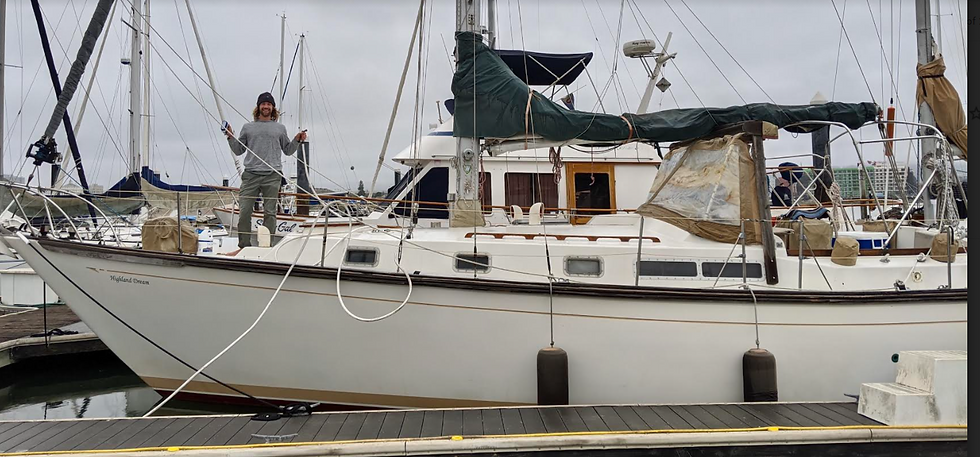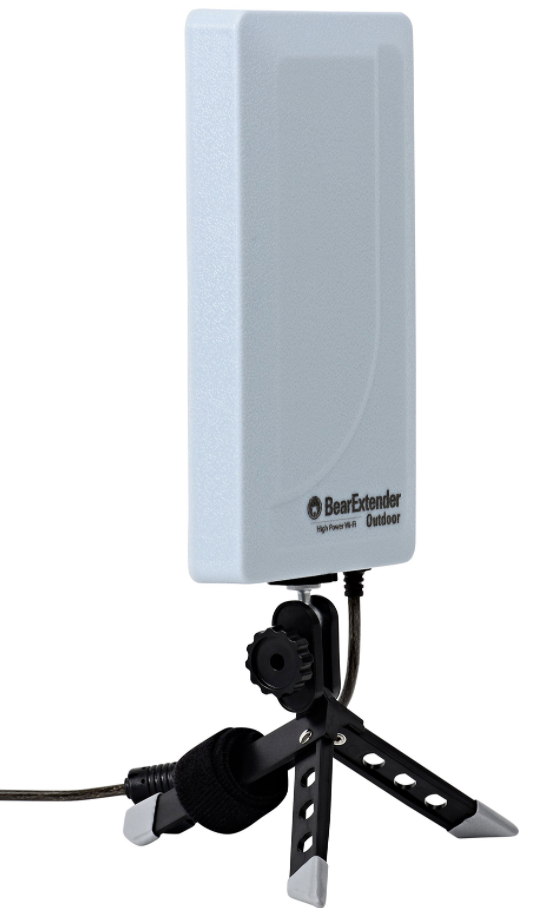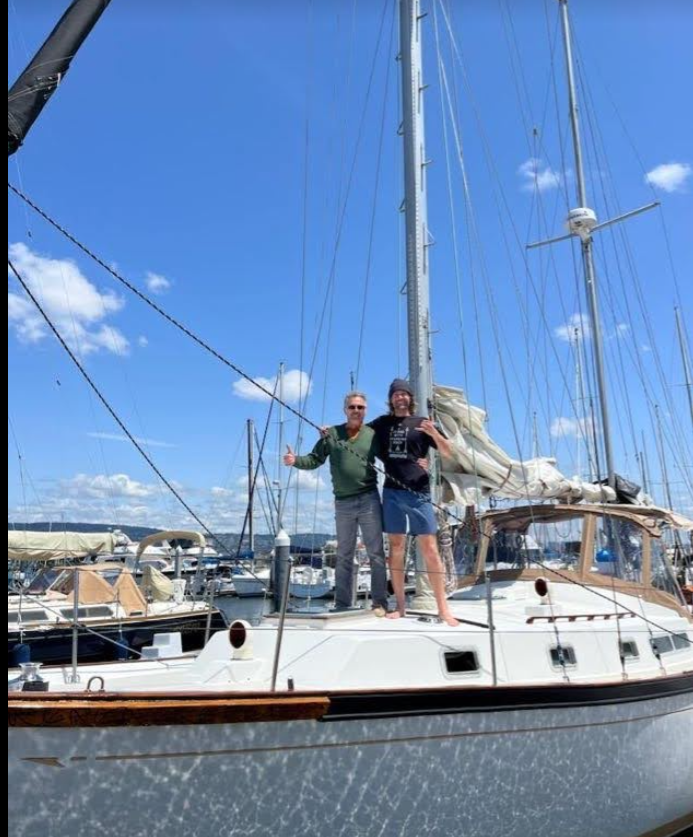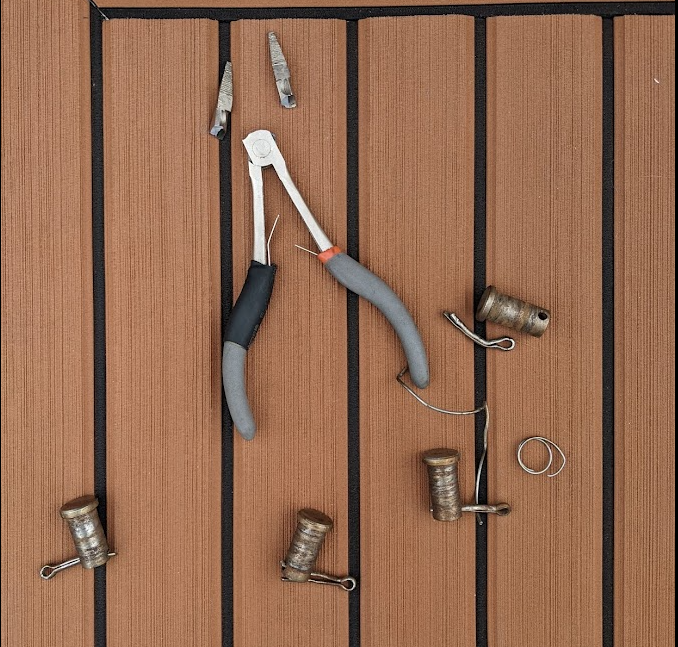Living Aboard: A Unique Balance of Work, Projects, and Life
- gcgegg91
- Jun 11, 2021
- 8 min read

Almost every time I tell some one that I live on a boat, I get asked the same question: "Really?! What is that like?" The second question is usually "Do you ever get seasick?"
Luckily I have never been prone to seasickness, but that's the easy answer. The first one is a bit tougher. What is living in my tiny fiberglass home like? Te Ara is my floating office, my miniature house, and my workshop all combined into the same 450 square feet (not including the deck). With everything combined in such close proximity, I have encountered unique challenges to balance my job, my projects, and every other aspect that makes up life. I wanted to write this post to tell people about some of my experiences and how I have dealt with both the good and bad aspects of living aboard. I should note, Te Ara is currently berthed at the Oakland Yacht Club and I have the luxury of having access to the club amenities as a member. That being said, I have also lived aboard a boat at sea, and will cover aspects of both scenarios in the following post. My hope is that by sharing some of these stories and experiences, it will help educate others who may be thinking of living a bit "outside the norm", whether that be van life, boat life, or something unique to you.
Working from Yacht
I always get a kick out of telling people "I work from yacht". Yes, Te Ara is technically a yacht even if she is close to 50 years old. She's a classy old lady....Quick aside: I was on a video call with a consultant a month ago and was asked "Are you in your library?" Boy did I feel like a badass when I got to reply (insert snooty voice) "Actually... I'm on my yacht." Seriously, who has a library?
Since the start of the COVID pandemic, working remotely has become the new norm. Some people who previously had office jobs never need to go back into a physical workplace again. As a Project Manager, I fell into this category. I work fully remote with teams across the globe and all I need is a good internet connection. Well guess what is not easy to come by living on a boat? Good internet.
I knew I would be facing this problem when I bought Te Ara. For anyone who is considering living and working aboard, this is one of the main things you need to think about if you want to keep up with your job, blog, or friends on social media. Luckily, this is not a new problem for people taking a slightly alternative path through life and there are a couple of solutions out there. I want to outline a few things I tried here. You can decide which is best for your situation.
Marina Wi-Fi: Most marinas in major city centers will have "free Wi-Fi". Yes, it connects you to the internet, but in my experience it is usually slow and certainly cannot handle 8 hours of 5-15 person video conferencing. You may get lucky and have a slip close to the router for better signal, but then other variables come into play.... like the tides. When I started working remotely on board, I noticed my internet would get very spotty and intermittent in the afternoons after running fine all morning. Reason: There was a 7 foot tidal swing that dropped my boat lower in the marina, putting the huge metal entrance gate and 5 boats between me and the nearest Wi-Fi signal. While convenient and free, Marina Wi-Fi is unlikely to meet your liveaboard needs.

2. Wi-Fi Booster: Wendy Gegg turned me onto these neat little gadgets shortly after I started working on board. I think they are absolutely fantastic, easy to use, and are needed by every cruiser. I personally have the Bearify USB Wi-Fi Extender aboard Te Ara. Basically, they connect through your USB port and boost a signal from up to half a mile away specifically for your computer. I started using one for work on Te Ara with marginal success. It certainly helped boost the signal for most standard tasks that I used my computer for, but it still struggled during the high definition video conferencing I was doing every day. I frequently got dropped from calls or had very slow, lagging speeds during group discussions. However, this tool has one HUGE plus that is why I rate it as a necessity on any cruiser. Remember: It can boost Wi-Fi signals up to a half mile away. Imagine pulling into an anchorage in Bora Bora and wanting to moor your boat in the lagoon marina. The marina office and attached restaurant have free Wi-Fi but it doesn't extend more than 20 ft past the building. Our sweet little toy can pick up that signal from out on the water, clear on the other side of the lagoon! Boom: Internet from your hammock while floating over the crystal clear waters of French Polynesia.
3. Hard Wire Internet, 5G Hot Spots, and Satellite Phones: I briefly tried using my iPhone as a hot spot for my computer. This probably worked the best of any of my initial attempts and could easily handle small video conferencing and day to day activities. I imagine that as 5G speeds become more ubiquitous, this will be one of the more popular options for cruisers and liveaboards. As long as you have cell signal, data, and battery power, you can have high speed internet. In the end, I opted for a more traditional route. I was lucky enough that the Oakland Yacht Club had the ability to get cable internet installed at each slip's power pedestal. It took a long time to get installed, and boy did I feel like a jerk when I asked what makes it take so long to run a cable.... As it turns out, our poor maintenance guy has to pull up most of the dock boards for 30 ft from the cable pin to the pedestal where you want internet. Not an easy job and I did not complain again after learning this. (Thanks Dan!). Now I have a combined router and modem connected to a traditional cable and it meets all my internet needs. If you are thinking of living aboard, the opportunity to have this luxury is something you should ask about at any potential marina where your boat is berthed.
This is all fine and dandy when near shore, but what do you do on the longer passages at sea? Im talking multiple weeks out of sight of land. Enter the satellite phone. These amazing pieces of technology are a must have on a boat that is thinking of doing any serious cruising. There are multiple services out there that will allow you to sign up for data packages. You can then use the sat phone pretty much anywhere in the world to download and send email, check weather forecasts for the next week at sea, or make calls to home when you forget Mother's Day (sorry mom). We used one on Bangorang almost every day to update the blog and send/receive emails, even when a thousand miles offshore.
Ultimately, once the internet issue was solved, working on board was no different from working at my home office or at a desk in a company building.... except for those killer views.
Always a Project
I will fully admit, I have skipped out on work many times to do boat projects. This is one of the hardest things for me to balance when both my work and workshop are in such close proximity. It is way too easy to take 15, 30, or 45 minutes off to putter with my current repair or boat job. Luckily, being a project manager I am excellent at efficient execution and time/resource management..... or so I tell myself.
When I first bought Te Ara, I was giving her a much needed wash down when one of my neighbors approached me. He said "Wow that is a big boat. Do you know what the best thing about getting a boat like that is? You never again have to worry about what to do with your free time." I have found this to be all too true. Te Ara is squarely in the realm of "project boat". The engine runs and she sails well without sinking. Pretty much every other system on the boat needed maintenance, upgrading, or removal and redesigned/replaced. And that's not even including the things I want to add!

Why buy such a boat? Great question. I purposefully sought out a project when I was touring vessels. To start, they will always be cheaper. I gave myself a budget of $45,000 and bought Te Ara for $37,000 after negotiating down from $52,000. I used all the systems that needed fixing as the basis for these negotiations. The second reason is that I wanted a project boat that I would need to fix up. This boat will force me to learn the intricacies and details of every system by the time I am ready to start my cruise. In my mind, this is the most important thing a captain can know. I want to leave that dock with the confidence that I can fix anything that breaks and I wont be needlessly endangering my crew because of ignorance.
Finally, I bought a project boat because I genuinely enjoy the work. I love staying busy, learning new skills, and generally just making things better than I found them. Sitting still is one of the hardest things for me to do, and Te Ara gives me plenty of activities to occupy my time. For anyone who is contemplating a path similar to mine, I would recommend you consider the following: Why do you want a boat, how much work are you willing to put into it, and do you enjoy that work? I thank those who have heard me vent my frustrations in the past (Dad and McKay) but I love what I get to do, even when I end my day late at night covered in diesel gas and engine oil (as I write this post).
Life
One moment that will stick with me forever was 8 years ago when I was working the night shift at Pacific Diagnostics Labs in Santa Barbara. I had just informed my boss that I would be using all of my PTO to take a month off and fly to Mexico, where I met up with Colin and Wendy Gegg to sail their 41 ft Catamaran "Bangorang" to the Marquesas. My boss took a moment to let that sink in and asked " Why would you want to do that? Don't you feel like you are putting your career and life on hold to do something like that?" To this day, I still do not completely understand what she meant. The reason we work should be to live the life we choose, and the life I chose is exploring the Pacific. After I got back from that trip, I worked for a few more months, quit for a new job, worked for another year and a half then quit to go sailing.... again! This is the lifestyle that I love, and I will choose it every time.
That being said, life cant be all about boats. (This is where the post turns romantic). If I were alone on this path, I would likely spend every waking moment working at my job or on my boat. I am lucky enough that McKay has chosen to follow this dream with me. Whenever I get too wound up on work or the boat, I can always count on her to bring me back to an even keel. She reminds me that there is more to life than work and projects, and the adventure that I love can be all around us, whether its spending the weekend away hiking or staying up late at night gossiping. So thank you McKay, for being there with me on this journey and showing me what true life is all about. I know that we have many more adventures ahead. To everyone else, I sincerely hope that those reading this post have someone they can count on in the same way.






Maybe McKay could write the blog occasionally???
I forgive you for the Mothers Day faux paus …(don’t let it happen again 😘)